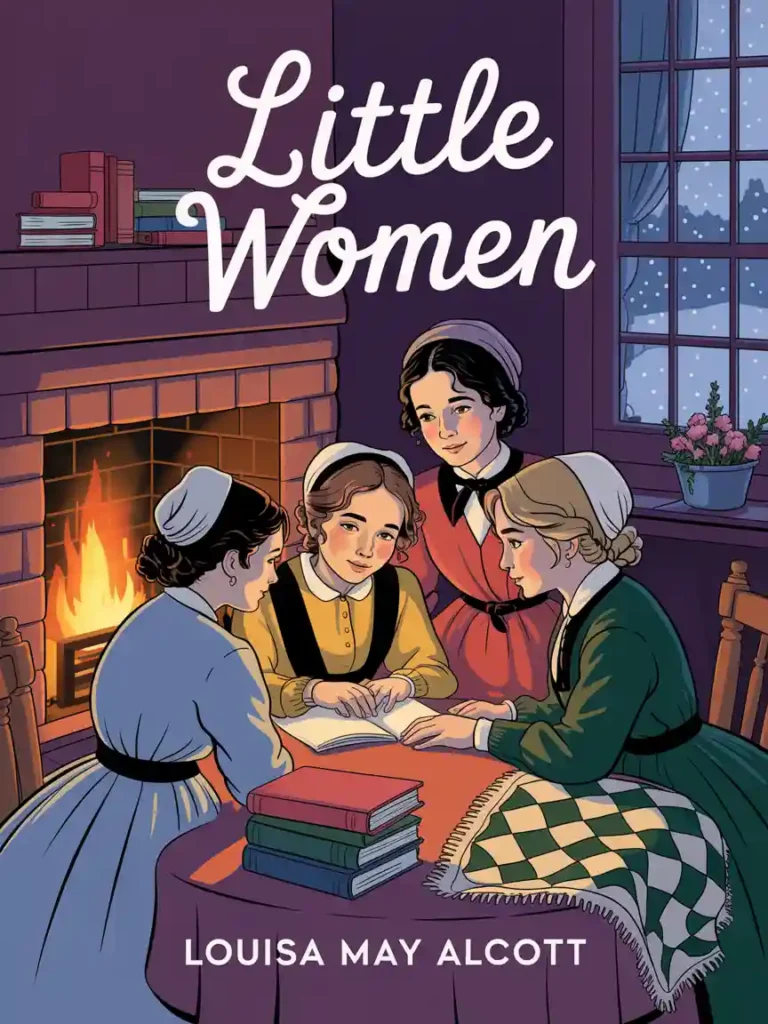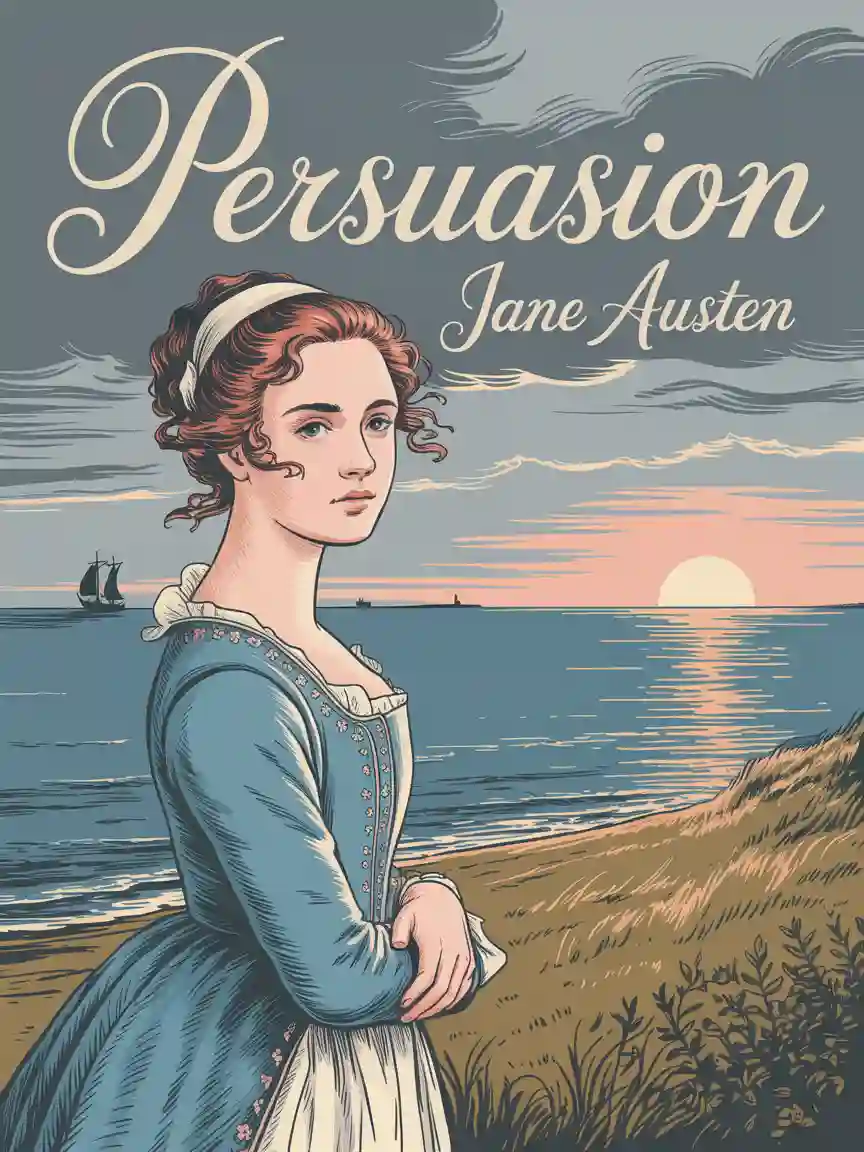CHAPTER THIRTY-FIVE
HEARTACHE
Whatever his motive might have been, Laurie studied to some purpose
that year, for he graduated with honor, and gave the Latin oration with the
grace of a Phillips and the eloquence of a Demosthenes, so his friends said.
They were all there, his grandfather—oh, so proud—Mr. and Mrs. March,
John and Meg, Jo and Beth, and all exulted over him with the sincere
admiration which boys make light of at the time, but fail to win from the
world by any after-triumphs.
“I’ve got to stay for this confounded supper, but I shall be home early
tomorrow. You’ll come and meet me as usual, girls?” Laurie said, as he put
the sisters into the carriage after the joys of the day were over. He said
‘girls’, but he meant Jo, for she was the only one who kept up the old
custom. She had not the heart to refuse her splendid, successful boy
anything, and answered warmly…
“I’ll come, Teddy, rain or shine, and march before you, playing ‘Hail the
conquering hero comes’ on a jew’s-harp.”
Laurie thanked her with a look that made her think in a sudden panic,
“Oh, deary me! I know he’ll say something, and then what shall I do?”
Evening meditation and morning work somewhat allayed her fears, and
having decided that she wouldn’t be vain enough to think people were
going to propose when she had given them every reason to know what her
answer would be, she set forth at the appointed time, hoping Teddy
wouldn’t do anything to make her hurt his poor feelings. A call at Meg’s,
and a refreshing sniff and sip at the Daisy and Demijohn, still further
fortified her for the tete-a-tete, but when she saw a stalwart figure looming
in the distance, she had a strong desire to turn about and run away.
“Where’s the jew’s-harp, Jo?” cried Laurie, as soon as he was within
speaking distance.
“I forgot it.” And Jo took heart again, for that salutation could not be
called lover-like.
She always used to take his arm on these occasions, now she did not, and
he made no complaint, which was a bad sign, but talked on rapidly about all
sorts of faraway subjects, till they turned from the road into the little path
that led homeward through the grove. Then he walked more slowly,
suddenly lost his fine flow of language, and now and then a dreadful pause
occurred. To rescue the conversation from one of the wells of silence into
which it kept falling, Jo said hastily, “Now you must have a good long
holiday!”
“I intend to.”
Something in his resolute tone made Jo look up quickly to find him
looking down at her with an expression that assured her the dreaded
moment had come, and made her put out her hand with an imploring, “No,
Teddy. Please don’t!”
“I will, and you must hear me. It’s no use, Jo, we’ve got to have it out,
and the sooner the better for both of us,” he answered, getting flushed and
excited all at once.
“Say what you like then. I’ll listen,” said Jo, with a desperate sort of
patience.
Laurie was a young lover, but he was in earnest, and meant to ‘have it
out’, if he died in the attempt, so he plunged into the subject with
characteristic impetuousity, saying in a voice that would get choky now and
then, in spite of manful efforts to keep it steady…
“I’ve loved you ever since I’ve known you, Jo, couldn’t help it, you’ve
been so good to me. I’ve tried to show it, but you wouldn’t let me. Now I’m
going to make you hear, and give me an answer, for I can’t go on so any
longer.”
“I wanted to save you this. I thought you’d understand…” began Jo,
finding it a great deal harder than she expected.
“I know you did, but the girls are so queer you never know what they
mean. They say no when they mean yes, and drive a man out of his wits just
for the fun of it,” returned Laurie, entrenching himself behind an undeniable
fact.
“I don’t. I never wanted to make you care for me so, and I went away to
keep you from it if I could.”
“I thought so. It was like you, but it was no use. I only loved you all the
more, and I worked hard to please you, and I gave up billiards and
everything you didn’t like, and waited and never complained, for I hoped
you’d love me, though I’m not half good enough…” Here there was a choke
that couldn’t be controlled, so he decapitated buttercups while he cleared
his ‘confounded throat’.
“You, you are, you’re a great deal too good for me, and I’m so grateful to
you, and so proud and fond of you, I don’t know why I can’t love you as
you want me to. I’ve tried, but I can’t change the feeling, and it would be a
lie to say I do when I don’t.”
“Really, truly, Jo?”
He stopped short, and caught both her hands as he put his question with a
look that she did not soon forget.
“Really, truly, dear.”
They were in the grove now, close by the stile, and when the last words
fell reluctantly from Jo’s lips, Laurie dropped her hands and turned as if to
go on, but for once in his life the fence was too much for him. So he just
laid his head down on the mossy post, and stood so still that Jo was
frightened.
“Oh, Teddy, I’m sorry, so desperately sorry, I could kill myself if it would
do any good! I wish you wouldn’t take it so hard, I can’t help it. You know
it’s impossible for people to make themselves love other people if they
don’t,” cried Jo inelegantly but remorsefully, as she softly patted his
shoulder, remembering the time when he had comforted her so long ago.
“They do sometimes,” said a muffled voice from the post. “I don’t
believe it’s the right sort of love, and I’d rather not try it,” was the decided
answer.
There was a long pause, while a blackbird sung blithely on the willow by
the river, and the tall grass rustled in the wind. Presently Jo said very
soberly, as she sat down on the step of the stile, “Laurie, I want to tell you
something.”
He started as if he had been shot, threw up his head, and cried out in a
fierce tone, “Don’t tell me that, Jo, I can’t bear it now!”
“Tell what?” she asked, wondering at his violence.
“That you love that old man.”
“What old man?” demanded Jo, thinking he must mean his grandfather.
“That devilish Professor you were always writing about. If you say you
love him, I know I shall do something desperate;” and he looked as if he
would keep his word, as he clenched his hands with a wrathful spark in his
eyes.
Jo wanted to laugh, but restrained herself and said warmly, for she too,
was getting excited with all this, “Don’t swear, Teddy! He isn’t old, nor
anything bad, but good and kind, and the best friend I’ve got, next to you.
Pray, don’t fly into a passion. I want to be kind, but I know I shall get angry
if you abuse my Professor. I haven’t the least idea of loving him or anybody
else.”
“But you will after a while, and then what will become of me?”
“You’ll love someone else too, like a sensible boy, and forget all this
trouble.”
“I can’t love anyone else, and I’ll never forget you, Jo, Never! Never!”
with a stamp to emphasize his passionate words.
“What shall I do with him?” sighed Jo, finding that emotions were more
unmanagable than she expected. “You haven’t heard what I wanted to tell
you. Sit down and listen, for indeed I want to do right and make you
happy,” she said, hoping to soothe him with a little reason, which proved
that she knew nothing about love.
Seeing a ray of hope in that last speech, Laurie threw himself down on
the grass at her feet, leaned his arm on the lower step of the stile, and
looked up at her with an expectant face. Now that arrangement was not
conducive to calm speech or clear thought on Jo’s part, for how could she
say hard things to her boy while he watched her with eyes full of love and
longing, and lashes still wet with the bitter drop or two her hardness of heart
had wrung from him? She gently turned his head away, saying, as she
stroked the wavy hair which had been allowed to grow for her sake—how
touching that was, to be sure! “I agree with Mother that you and I are not
suited to each other, because our quick tempers and strong wills would
probably make us very miserable, if we were so foolish as to…” Jo paused a
little over the last word, but Laurie uttered it with a rapturous expression.
“Marry—no we shouldn’t! If you loved me, Jo, I should be a perfect
saint, for you could make me anything you like.”
“No, I can’t. I’ve tried and failed, and I won’t risk our happiness by such
a serious experiment. We don’t agree and we never shall, so we’ll be good
friends all our lives, but we won’t go and do anything rash.”
“Yes, we will if we get the chance,” muttered Laurie rebelliously.
“Now do be reasonable, and take a sensible view of the case,” implored
Jo, almost at her wit’s end.
“I won’t be reasonable. I don’t want to take what you call ‘a sensible
view’. It won’t help me, and it only makes it harder. I don’t believe you’ve
got any heart.”
“I wish I hadn’t.”
There was a little quiver in Jo’s voice, and thinking it a good omen,
Laurie turned round, bringing all his persuasive powers to bear as he said,
in the wheedlesome tone that had never been so dangerously wheedlesome
before, “Don’t disappoint us, dear! Everyone expects it. Grandpa has set his
heart upon it, your people like it, and I can’t get on without you. Say you
will, and let’s be happy. Do, do!”
Not until months afterward did Jo understand how she had the strength of
mind to hold fast to the resolution she had made when she decided that she
did not love her boy, and never could. It was very hard to do, but she did it,
knowing that delay was both useless and cruel.
“I can’t say ‘yes’ truly, so I won’t say it at all. You’ll see that I’m right,
by-and-by, and thank me for it…” she began solemnly.
“I’ll be hanged if I do!” and Laurie bounced up off the grass, burning
with indignation at the very idea.
“Yes, you will!” persisted Jo. “You’ll get over this after a while, and find
some lovely accomplished girl, who will adore you, and make a fine
mistress for your fine house. I shouldn’t. I’m homely and awkward and odd
and old, and you’d be ashamed of me, and we should quarrel—we can’t
help it even now, you see—and I shouldn’t like elegant society and you
would, and you’d hate my scribbling, and I couldn’t get on without it, and
we should be unhappy, and wish we hadn’t done it, and everything would
be horrid!”
“Anything more?” asked Laurie, finding it hard to listen patiently to this
prophetic burst.
“Nothing more, except that I don’t believe I shall ever marry. I’m happy
as I am, and love my liberty too well to be in a hurry to give it up for any
mortal man.”
“I know better!” broke in Laurie. “You think so now, but there’ll come a
time when you will care for somebody, and you’ll love him tremendously,
and live and die for him. I know you will, it’s your way, and I shall have to
stand by and see it,” and the despairing lover cast his hat upon the ground
with a gesture that would have seemed comical, if his face had not been so
tragic.
“Yes, I will live and die for him, if he ever comes and makes me love him
in spite of myself, and you must do the best you can!” cried Jo, losing
patience with poor Teddy. “I’ve done my best, but you won’t be reasonable,
and it’s selfish of you to keep teasing for what I can’t give. I shall always be
fond of you, very fond indeed, as a friend, but I’ll never marry you, and the
sooner you believe it the better for both of us—so now!”
That speech was like gunpowder. Laurie looked at her a minute as if he
did not quite know what to do with himself, then turned sharply away,
saying in a desperate sort of tone, “You’ll be sorry some day, Jo.”
“Oh, where are you going?” she cried, for his face frightened her.
“To the devil!” was the consoling answer.
For a minute Jo’s heart stood still, as he swung himself down the bank
toward the river, but it takes much folly, sin or misery to send a young man
to a violent death, and Laurie was not one of the weak sort who are
conquered by a single failure. He had no thought of a melodramatic plunge,
but some blind instinct led him to fling hat and coat into his boat, and row
away with all his might, making better time up the river than he had done in
any race. Jo drew a long breath and unclasped her hands as she watched the
poor fellow trying to outstrip the trouble which he carried in his heart.
“That will do him good, and he’ll come home in such a tender, penitent
state of mind, that I shan’t dare to see him,” she said, adding, as she went
slowly home, feeling as if she had murdered some innocent thing, and
buried it under the leaves. “Now I must go and prepare Mr. Laurence to be
very kind to my poor boy. I wish he’d love Beth, perhaps he may in time,
but I begin to think I was mistaken about her. Oh dear! How can girls like to
have lovers and refuse them? I think it’s dreadful.”
Being sure that no one could do it so well as herself, she went straight to
Mr. Laurence, told the hard story bravely through, and then broke down,
crying so dismally over her own insensibility that the kind old gentleman,
though sorely disappointed, did not utter a reproach. He found it difficult to
understand how any girl could help loving Laurie, and hoped she would
change her mind, but he knew even better than Jo that love cannot be
forced, so he shook his head sadly and resolved to carry his boy out of
harm’s way, for Young Impetuosity’s parting words to Jo disturbed him
more than he would confess.
When Laurie came home, dead tired but quite composed, his grandfather
met him as if he knew nothing, and kept up the delusion very successfully
for an hour or two. But when they sat together in the twilight, the time they
used to enjoy so much, it was hard work for the old man to ramble on as
usual, and harder still for the young one to listen to praises of the last year’s
success, which to him now seemed like love’s labor lost. He bore it as long
as he could, then went to his piano and began to play. The windows were
open, and Jo, walking in the garden with Beth, for once understood music
better than her sister, for he played the ‘Sonata Pathetique’, and played it as
he never did before.
“That’s very fine, I dare say, but it’s sad enough to make one cry. Give us
something gayer, lad,” said Mr. Laurence, whose kind old heart was full of
sympathy, which he longed to show but knew not how.
Laurie dashed into a livelier strain, played stormily for several minutes,
and would have got through bravely, if in a momentary lull Mrs. March’s
voice had not been heard calling, “Jo, dear, come in. I want you.”
Just what Laurie longed to say, with a different meaning! As he listened,
he lost his place, the music ended with a broken chord, and the musician sat
silent in the dark.
“I can’t stand this,” muttered the old gentleman. Up he got, groped his
way to the piano, laid a kind hand on either of the broad shoulders, and
said, as gently as a woman, “I know, my boy, I know.”
No answer for an instant, then Laurie asked sharply, “Who told you?”
“Jo herself.”
“Then there’s an end of it!” And he shook off his grandfather’s hands
with an impatient motion, for though grateful for the sympathy, his man’s
pride could not bear a man’s pity.
“Not quite. I want to say one thing, and then there shall be an end of it,”
returned Mr. Laurence with unusual mildness. “You won’t care to stay at
home now, perhaps?”
“I don’t intend to run away from a girl. Jo can’t prevent my seeing her,
and I shall stay and do it as long as I like,” interrupted Laurie in a defiant
tone.
“Not if you are the gentleman I think you. I’m disappointed, but the girl
can’t help it, and the only thing left for you to do is to go away for a time.
Where will you go?”
“Anywhere. I don’t care what becomes of me,” and Laurie got up with a
reckless laugh that grated on his grandfather’s ear.
“Take it like a man, and don’t do anything rash, for God’s sake. Why not
go abroad, as you planned, and forget it?”
“I can’t.”
“But you’ve been wild to go, and I promised you should when you got
through college.”
“Ah, but I didn’t mean to go alone!” and Laurie walked fast through the
room with an expression which it was well his grandfather did not see.
“I don’t ask you to go alone. There’s someone ready and glad to go with
you, anywhere in the world.”
“Who, Sir?” stopping to listen.
“Myself.”
Laurie came back as quickly as he went, and put out his hand, saying
huskily, “I’m a selfish brute, but—you know—Grandfather—”
“Lord help me, yes, I do know, for I’ve been through it all before, once in
my own young days, and then with your father. Now, my dear boy, just sit
quietly down and hear my plan. It’s all settled, and can be carried out at
once,” said Mr. Laurence, keeping hold of the young man, as if fearful that
he would break away as his father had done before him.
“Well, sir, what is it?” and Laurie sat down, without a sign of interest in
face or voice.
“There is business in London that needs looking after. I meant you should
attend to it, but I can do it better myself, and things here will get on very
well with Brooke to manage them. My partners do almost everything, I’m
merely holding on until you take my place, and can be off at any time.”
“But you hate traveling, Sir. I can’t ask it of you at your age,” began
Laurie, who was grateful for the sacrifice, but much preferred to go alone, if
he went at all.
The old gentleman knew that perfectly well, and particularly desired to
prevent it, for the mood in which he found his grandson assured him that it
would not be wise to leave him to his own devices. So, stifling a natural
regret at the thought of the home comforts he would leave behind him, he
said stoutly, “Bless your soul, I’m not superannuated yet. I quite enjoy the
idea. It will do me good, and my old bones won’t suffer, for traveling
nowadays is almost as easy as sitting in a chair.”
A restless movement from Laurie suggested that his chair was not easy,
or that he did not like the plan, and made the old man add hastily, “I don’t
mean to be a marplot or a burden. I go because I think you’d feel happier
than if I was left behind. I don’t intend to gad about with you, but leave you
free to go where you like, while I amuse myself in my own way. I’ve
friends in London and Paris, and should like to visit them. Meantime you
can go to Italy, Germany, Switzerland, where you will, and enjoy pictures,
music, scenery, and adventures to your heart’s content.”
Now, Laurie felt just then that his heart was entirely broken and the
world a howling wilderness, but at the sound of certain words which the old
gentleman artfully introduced into his closing sentence, the broken heart
gave an unexpected leap, and a green oasis or two suddenly appeared in the
howling wilderness. He sighed, and then said, in a spiritless tone, “Just as
you like, Sir. It doesn’t matter where I go or what I do.”
“It does to me, remember that, my lad. I give you entire liberty, but I trust
you to make an honest use of it. Promise me that, Laurie.”
“Anything you like, Sir.”
“Good,” thought the old gentleman. “You don’t care now, but there’ll
come a time when that promise will keep you out of mischief, or I’m much
mistaken.”
Being an energetic individual, Mr. Laurence struck while the iron was
hot, and before the blighted being recovered spirit enough to rebel, they
were off. During the time necessary for preparation, Laurie bore himself as
young gentleman usually do in such cases. He was moody, irritable, and
pensive by turns, lost his appetite, neglected his dress and devoted much
time to playing tempestuously on his piano, avoided Jo, but consoled
himself by staring at her from his window, with a tragic face that haunted
her dreams by night and oppressed her with a heavy sense of guilt by day.
Unlike some sufferers, he never spoke of his unrequited passion, and would
allow no one, not even Mrs. March, to attempt consolation or offer
sympathy. On some accounts, this was a relief to his friends, but the weeks
before his departure were very uncomfortable, and everyone rejoiced that
the ‘poor, dear fellow was going away to forget his trouble, and come home
happy’. Of course, he smiled darkly at their delusion, but passed it by with
the sad superiority of one who knew that his fidelity like his love was
unalterable.
When the parting came he affected high spirits, to conceal certain
inconvenient emotions which seemed inclined to assert themselves. This
gaiety did not impose upon anybody, but they tried to look as if it did for his
sake, and he got on very well till Mrs. March kissed him, with a whisper
full of motherly solicitude. Then feeling that he was going very fast, he
hastily embraced them all round, not forgetting the afflicted Hannah, and
ran downstairs as if for his life. Jo followed a minute after to wave her hand
to him if he looked round. He did look round, came back, put his arms
about her as she stood on the step above him, and looked up at her with a
face that made his short appeal eloquent and pathetic.
“Oh, Jo, can’t you?”
“Teddy, dear, I wish I could!”
That was all, except a little pause. Then Laurie straightened himself up,
said, “It’s all right, never mind,” and went away without another word. Ah,
but it wasn’t all right, and Jo did mind, for while the curly head lay on her
arm a minute after her hard answer, she felt as if she had stabbed her dearest
friend, and when he left her without a look behind him, she knew that the
boy Laurie never would come again.





